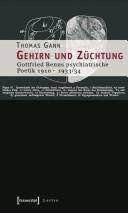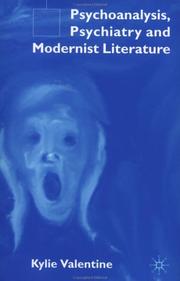| Listing 1 - 10 of 23 | << page >> |
Sort by
|
Book
Year: 1930 Publisher: Berlin Leipzig : de Gruyter,
Abstract | Keywords | Export | Availability | Bookmark
 Loading...
Loading...Choose an application
- Reference Manager
- EndNote
- RefWorks (Direct export to RefWorks)
Book
ISBN: 9780231214643 0231214642 9780231214650 0231214650 Year: 2024 Publisher: New York : Columbia University Press,
Abstract | Keywords | Export | Availability | Bookmark
 Loading...
Loading...Choose an application
- Reference Manager
- EndNote
- RefWorks (Direct export to RefWorks)
Between 1880 and 1920 in Germany, the Austro-Hungarian Empire, and Russia the mind sciences (psychology, psychiatry, neuroscience) began to first take shape. These new demographically applicable studies of the mind were soon integrated into the modern nation-states. In Psychic Empire, Cate Reilly examines how writers explored the increasng presence of a calculable, scientific regulation of mental health. She demonstrates how literary texts revealed the impact of this development on the collective mental landscape, tracing its consequences both for subject formation and in the popular, literary imagination. Reilly focuses on writers whose work offers an account of the psychiatric subject living under a developing psychopolitical regime. She considers the growing divergence between psychiatrist Emil Kraepelin's empirico-statistical methodology and Freud's individualized, language-focused practice. Subsequent chapters follow how a German-Jewish Expressionist play (written by Kraepelin patient Ernst Toller) contested the racialized, proto-fascist aspects of Kraeplin's psychiatric taxonomy and how a Soviet novel by Vsevolod Ivanov sheds light on psychopower's implications for dominant economic systems. Reilly also examines psychopower's new interface with the judicial system via a German transgender memoir tied to a psychiatric legal case (Daniel Paul Schreber), and then turns to a Bolshevik mass spectacle that utilized empirical psychology to catalyze Marxist-Leninist political "consciousness." In discussing the work of these writers, Reilly argues that aesthetic objects are tools to understand mind sciences rather than illustrations of them
Psychiatry in literature --- Modernism (Literature) --- Psychiatry in literature. --- Psychiatrie. --- Modernisme (littérature)
Book
ISBN: 3770530322 Year: 1995 Publisher: München Fink
Abstract | Keywords | Export | Availability | Bookmark
 Loading...
Loading...Choose an application
- Reference Manager
- EndNote
- RefWorks (Direct export to RefWorks)
Döblin, Alfred --- Mental illness in literature. --- Psychiatry in literature.

ISBN: 9783899426519 Year: 2007 Publisher: Bielefeld Transcript
Abstract | Keywords | Export | Availability | Bookmark
 Loading...
Loading...Choose an application
- Reference Manager
- EndNote
- RefWorks (Direct export to RefWorks)
Psychiatry in literature --- Benn, Gottfried --- Criticism and interpretation.
Book
Year: 2003 Publisher: Basingstoke: Palgrave MacMillan,
Abstract | Keywords | Export | Availability | Bookmark
 Loading...
Loading...Choose an application
- Reference Manager
- EndNote
- RefWorks (Direct export to RefWorks)
TOC:http://www.loc.gov/catdir/toc/fy042/2002035535.html
Psychology in literature --- English literature --- Modernism (Literature) --- Psychoanalysis and literature --- Literature --- Psychiatry in literature
Book
ISBN: 9781107176645 1107176646 9781316817155 9781316629871 1316821277 1316817156 1316819590 9781316819593 9781316821275 Year: 2018 Publisher: Cambridge Cambridge University Press
Abstract | Keywords | Export | Availability | Bookmark
 Loading...
Loading...Choose an application
- Reference Manager
- EndNote
- RefWorks (Direct export to RefWorks)
As a concept, 'trauma' has attracted a great deal of interest in literary studies. A key term in psychoanalytic approaches to literary study, trauma theory represents a critical approach that enables new modes of reading and of listening. It is a leading concept of our time, applicable to individuals, cultures, and nations. This book traces how trauma theory has come to constitute a discrete but influential approach within literary criticism in recent decades. It offers an overview of the genesis and growth of literary trauma theory, recording the evolution of the concept of trauma in relation to literary studies. In twenty-one essays, covering the origins, development, and applications of trauma in literary studies, Trauma and Literature addresses the relevance and impact this concept has in the field.
Psychiatry in Literature. --- Psychological Trauma. --- Psychiatry in Literature --- Psychic trauma in literature. --- Psychic trauma in literature --- Psychological Trauma --- Literature, Psychiatry in --- Literatures, Psychiatry in --- Psychiatry in Literatures --- in Literature, Psychiatry --- in Literatures, Psychiatry --- Trauma, Psychological --- Literature --- Philosophy.
Book
ISBN: 9781138784277 1138784273 9781138784284 1138784281 1315149257 9781315149257 9781351371032 Year: 2018 Publisher: Milton Park, Abingdon, Oxon ; New York : Routledge,
Abstract | Keywords | Export | Availability | Bookmark
 Loading...
Loading...Choose an application
- Reference Manager
- EndNote
- RefWorks (Direct export to RefWorks)
"Madness, Art, and Society engages with artistic practices from theatre and live art to graphic fiction, charting a multiplicity of ways of thinking critically with, rather than about, non-normative psychological experience. It is organised into two parts, 'Psychiatrists, Institutions, Treatments', which illuminates the environments, figures and models of psychiatric care, and 'Realities, Bodies, Moods', which rejects diagnostic categories in favour of a radical openness to the diversity of madness. Reading the works discussed as a form of protest literature, Madness, Art, and Society seeks a more nuanced understanding of the plurality of madness in contemporary art and society."--Provided by publisher.
Literature. --- Medicine in the Arts. --- Mental Disorders. --- Mental illness in literature. --- Mental illness in motion pictures. --- Mental illness --- Mentally Ill Persons. --- Psychiatry in Literature. --- Psychiatry in literature. --- Psychiatry in motion pictures. --- Psychiatry --- Social aspects.

ISBN: 1403900612 Year: 2003 Publisher: Basingstoke : Palgrave Macmillan,
Abstract | Keywords | Export | Availability | Bookmark
 Loading...
Loading...Choose an application
- Reference Manager
- EndNote
- RefWorks (Direct export to RefWorks)
English literature --- Literature --- Modernism (Literature) --- Psychiatry in literature. --- Psychoanalysis and literature --- Psychology in literature. --- History and criticism --- Psychology.
Book
ISBN: 9781438473451 9781438473475 1438473478 1438473451 1438473478 Year: 2019 Publisher: Albany, New York : State University of New York Press,
Abstract | Keywords | Export | Availability | Bookmark
 Loading...
Loading...Choose an application
- Reference Manager
- EndNote
- RefWorks (Direct export to RefWorks)
Lacan and Romanticism uses the work of psychoanalyst Jacques Lacan to deliver progressive readings of Romanticism by examining canonical Romantic authors such as William Wordsworth, Mary Shelley, John Keats, and Jane Austen, as well as lesser-known writers such as the graveyard poets and Sarah Scott. The contributors develop innovative approaches to Lacanian literary studies, focusing on neglected or emergent areas of Lacan's thought and approaching Lacan's best-known work in unexpected ways. The essay topics include the visible and seeable, war, the death drive, nonhuman sexualities, sublimation, loss and mourning, utopia, capitalism, fantasy, and topology, and they range from the mid-eighteenth through the early decades of the nineteenth centuries. The book reveals new ways of thinking about art and literature with psychoanalytic theory and suggests how theoretical approaches can contribute meaningfully to literary studies in general.
Romanticism --- Psychoanalysis and literature. --- English literature --- Psychiatry in literature. --- History and criticism. --- Lacan, Jacques, --- Influence. --- Literature and psychoanalysis --- Psychoanalytic literary criticism --- Literature --- Lacan, Jacques
Book
ISBN: 3110557746 3110558467 9783110558463 9783110557749 9783110558470 3110558475 9783110552874 3110552876 Year: 2017 Publisher: Berlin, [Germany] ; Boston, [Massachusetts] : De Gruyter,
Abstract | Keywords | Export | Availability | Bookmark
 Loading...
Loading...Choose an application
- Reference Manager
- EndNote
- RefWorks (Direct export to RefWorks)
Der Literaturwissenschaftler Walter Müller-Seidel zählt zu den einflussreichsten Vertretern seines Faches. Weit über dessen Grenzen hinaus setzte er sich mit anderen Disziplinen und Denksystemen auseinander. Seine vorliegenden Arbeiten von Goethe bis zur Weimarer Republik sind im Spannungsfeld von Psychiatrie, Strafrecht und Literatur angesiedelt und dokumentieren Elemente der literarischen und rechtlichen Entwicklungen der letzten 200 Jahre. The literary scholar Walter Müller-Seidel is among the most influential writers in his field. Going well beyond the boundaries of literature, he engaged with other disciplines and systems of thought. His papers collected in this volume extend from Goethe to the Weimar Republic, and include interfaces with psychiatry, penal law, and literature. They document the evolution of literature and the law over the past 200 years.
German literature --- Law and literature. --- Classicism --- Psychiatry in literature. --- Pseudo-classicism --- Aesthetics --- Literature --- Civilization, Classical --- Literature and law --- History and criticism. --- History
| Listing 1 - 10 of 23 | << page >> |
Sort by
|

 Search
Search Feedback
Feedback About UniCat
About UniCat  Help
Help News
News